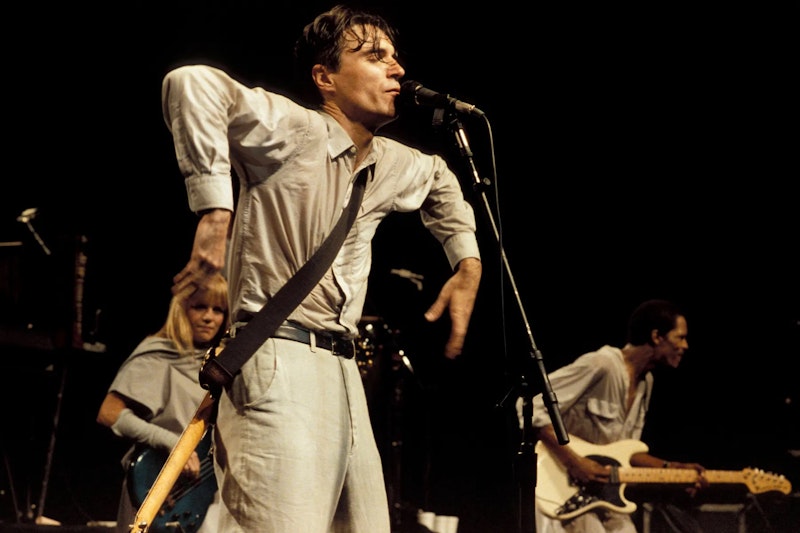A couple of weeks ago, my friend Leigh Ann went to see one of her favorite bands in one of her favorites movies: Stop Making Sense, a film by Jonathan Demme and Talking Heads. Released in 1984 a year after what would become the band’s last tour, Stop Making Sense and its images of David Byrne in an oversized gray suit landed in the pop cultural stratosphere and have stayed there ever since. Forty years after the stage show documented here, the Talking Heads remain as popular as ever, staples who’ve become “classic rock” by default and experienced a major Millennial renaissance in the late-2000s with “This Must Be the Place (Naive Melody).” When the band was touring, and even still together, that was never a red-letter song—“Once in a Lifetime” and “Burning Down the House” were the only real hits they ever had, even if only on MTV.
But Leigh Ann was annoyed by how many people in the audience were singing and clapping along, cheering and acting as if they were at an actual concert. Just a few weeks ago, I asked my friend Jordan if he was going to see the upcoming Taylor Swift concert film. He said roughly the same thing—the behavior of the audience would be too annoying. But isn’t this just stuff that people do at concerts? I tried to think of other examples, proper concert movies like The Last Waltz, Woodstock, and Sign ‘o’ the Times, but there just aren’t that many, especially not on the level of Stop Making Sense.
Even Sign ‘o’ the Times remains hard to find, while Prince’s star vehicle Purple Rain is another 1984 American classic. That kind of movie is much more common: A Hard Day’s Night, Spice World, Crossroads, 8 Mile. These are narrative films, no different in form than any other Hollywood drama. But concert films don’t resemble any other form of popular American cinema, not even the documentary (finally en vogue with the public). What do you do? Well, clap I guess—it is a concert. But this is all to say that any confusion is understandable when you think about how rare this kind of movie is, and why there aren’t more: only an artist as massive as Taylor Swift can pull it off while still active; David Byrne probably knew the band was done touring after 1983, and the movie could “tour” for them as they continued writing and recording new material.
It’s a boring answer, but concert films are rare because a stage show on the level of Stop Making Sense was only technologically possible in the 1980s, and by then home video began to bloom, and while artists did continue filming their shows, they bypassed cinemas and sold them direct to video. The Smashing Pumpkins and Nirvana made concert films, both good, but neither were ever theatrically released. Even Nirvana’s legendary Unplugged in New York special on MTV played there and remained there. Like Stop Making Sense, the set for Unplugged in New York is made to be filmed; movies like Woodstock and Monterey Pop capture historic moments and performances that need no more than competent documentary photography.
Most bands just aren’t interesting enough to warrant a theatrical concert film. You’re not doing a story, you’re not doing The Wall, this is just you, your music, and your show. Stop Making Sense is undeniable even if you don’t really like the Talking Heads, like me. I saw the re-release with my parents last weekend, and my dad loved the band, saw them in 1977 at the Marble Bar in Baltimore with a dozen other people, and years later at this very tour. He said the show was “electrifying” and the movie a genuine success; now, he says it’s “necessarily dated,” the most famous work of a band that’s long since entered the American pantheon.
Stop Making Sense demonstrates the limits of the concert film as much as its possibilities: Demme’s cameras rarely dolly, crane, or zoom, despite a few examples of each. He sticks to wides, mediums, and close-ups, along with plenty of handheld camerawork that never suggests we’re watching anything than a live concert. The band will begin, play a song, stop, play another song, stop, repeat… looking at it stated simply, it’s obvious why concert films are so rare: they ask the audience to stop every three or four minutes. Even in Sign ‘o’ the Times, which features brief interstitial narrative bits, the stopping and starting of songs determine the film’s rhythm and overall feeling. Stop Making Sense is a true “concert film,” documenting a remarkable stage show by a defining American band of the 1980s. It is not a “music film,” or a “visual album” like Animal Collective’s ODDSAC. If an artist wanted to make a true “music film,” the traditional pacing of a live show must be jettisoned for something more fluid. Stop Making Sense is as good as it can be.
—Follow Nicky Smith on Twitter: @nickyotissmith

